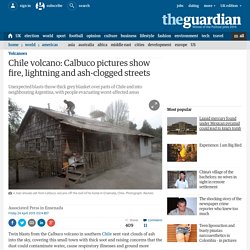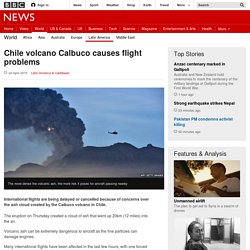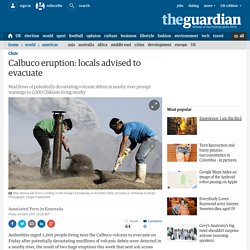

What do volcanic eruptions mean for the climate? 23 Apr 2015, 15:35Robert McSweeney & Roz Pidcock Having lain dormant for over 40 years, the Calbuco volcano last night erupted twice within the space of a few hours.

The blast sent a huge cloud of ash over southern Chile. Carbon Brief has asked a number of experts what volcano eruptions mean for the climate, and whether or not we can expect this latest event to have global consequences. Cooling effect Volcanic eruptions can affect climate in two main ways. First, they release the greenhouse gas carbon dioxide, contributing to warming of the atmosphere. Second, sulphur dioxide contained in the ash cloud can produce a cooling effect, explains Prof Jim McQuaid, professor of atmospheric composition at the University of Leeds: "Sulphur dioxide is quickly converted into sulphate aerosol which then alongside the fine volcanic ash forms a partial barrier to incoming solar radiation" You can see this in the NASA video below that maps movements of particles in the Earth's atmosphere.
View on YouTube. Calbuco volcano erupts in Chile and spews huge ash cloud – video. Chile's Calbuco volcano erupts - in pictures. Chile volcano: Calbuco pictures show fire, lightning and ash-clogged streets. Twin blasts from the Calbuco volcano in southern Chile sent vast clouds of ash into the sky, covering this small town with thick soot and raising concerns that the dust could contaminate water, cause respiratory illnesses and ground more flights.

Ensenada, in the foothills of the volcano, looked like a ghost town on Thursday but for an occasional horse or dog roaming its only street. Most of the 1,500 residents had evacuated after the initial eruption on Wednesday, with only about 30 people refusing to leave out of worry for their homes and animals. Daniel Patricio Gonzalez left with his wife, seven-year-old son, and twins aged six and four, but returned on Thursday night to assess the damage. The roof at the restaurant he manages had caved in from the weight of the mounting ash. “This hurts a bit but there’s nothing to do against nature. The volcano erupted on Wednesday afternoon for the first time in more than four decades, spewing out a plume of ash more than six miles high (10km.
Eyewitness: Volcano eruption in Chile. Chile volcano Calbuco causes flight problems - BBC News. International flights are being delayed or cancelled because of concerns over the ash cloud created by the Calbuco volcano in Chile.

The eruption on Thursday created a cloud of ash that went up 20km (12 miles) into the air. Volcanic ash can be extremely dangerous to aircraft as the fine particles can damage engines. Many international flights have been affected in the last few hours, with one forced to turn back to Australia. Qantas flight QF27 was five hours into its journey to Santiago when it had to turn back to Sydney late on Friday. A Qantas spokeswoman in Sydney said it returned because of concerns over the ash cloud. Two flights from the United States to Buenos Aires, one with Delta Air Lines and one with American Airlines, had to return to their departure airports. One Air France flight from Paris to Santiago had to land in Sao Paulo, Brazil, and another destined for Buenos Aires landed in Rio de Janeiro. Flight cancellations depend on the density of the ash emitted by a volcano. Calbuco eruption: locals advised to evacuate. Authorities urged 2,000 people living near the Calbuco volcano to evacuate on Friday after potentially devastating mudflows of volcanic debris were detected in a nearby river, the result of two huge eruptions this week that sent ash across large swaths of southern South America.

Chilean officials said the evacuations were precautionary but necessary, because flows of volcanic mud, known as lahars, are capable of levelling anything in their path. The area had been evacuated after the volcano first erupted on Wednesday afternoon, but by Friday many people had begun to return home. Authorities said the evacuees from the towns of Chamiza, Lago Chapo and Correntoso would stay at shelters in the nearby city of Puerto Montt. The volcano, which had been dormant for four decades, sent a plume of ash about 11 miles (18km) high during Wednesday’s blast.